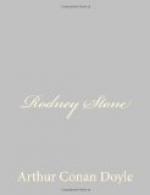“Once a week Harrison used to bring me up provisions, passing them through the pantry window, which I left open for the purpose. Sometimes I would steal out at night and walk under the stars once more, with the cool breeze upon my forehead; but this I had at last to stop, for I was seen by the rustics, and rumours of a spirit at Cliffe Royal began to get about. One night two ghost-hunters—”
“It was I, father,” cried Boy Jim; “I and my friend, Rodney Stone.”
“I know it was. Harrison told me so the same night. I was proud, James, to see that you had the spirit of the Barringtons, and that I had an heir whose gallantry might redeem the family blot which I have striven so hard to cover over. Then came the day when your mother’s kindness—her mistaken kindness—gave you the means of escaping to London.”
“Ah, Edward,” cried his wife, “if you had seen our boy, like a caged eagle, beating against the bars, you would have helped to give him even so short a flight as this.”
“I do not blame you, Mary. It is possible that I should have done so. He went to London, and he tried to open a career for himself by his own strength and courage. How many of our ancestors have done the same, save only that a sword-hilt lay in their closed hands; but of them all I do not know that any have carried themselves more gallantly!”
“That I dare swear,” said my uncle, heartily.
“And then, when Harrison at last returned, I learned that my son was actually matched to fight in a public prize-battle. That would not do, Charles! It was one thing to fight as you and I have fought in our youth, and it was another to compete for a purse of gold.”
“My dear friend, I would not for the world—”
“Of course you would not, Charles. You chose the best man, and how could you do otherwise? But it would not do! I determined that the time had come when I should reveal myself to my son, the more so as there were many signs that my most unnatural existence had seriously weakened my health. Chance, or shall I not rather say Providence, had at last made clear all that had been dark, and given me the means of establishing my innocence. My wife went yesterday to bring my boy at last to the side of his unfortunate father.”
There was silence for some time, and then it was my uncle’s voice which broke it.
“You’ve been the most ill-used man in the world, Ned,” said he. “Please God we shall have many years yet in which to make up to you for it. But, after all, it seems to me that we are as far as ever from learning how your unfortunate brother met his death.”
“For eighteen years it was as much a mystery to me as to you, Charles. But now at last the guilt is manifest. Stand forward, Ambrose, and tell your story as frankly and as fully as you have told it to me.”




